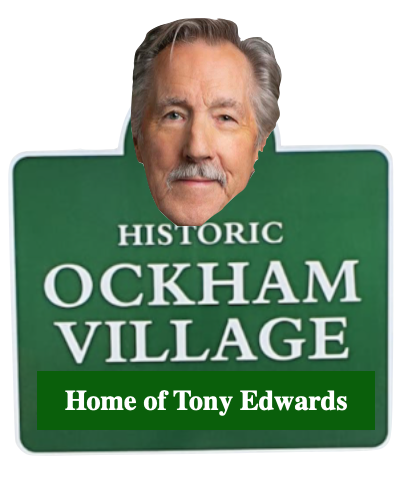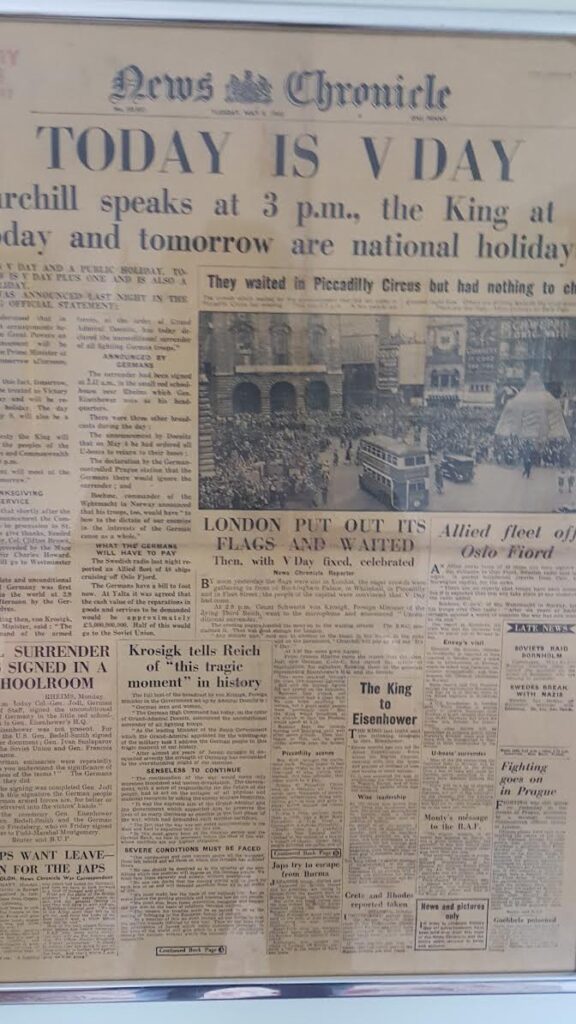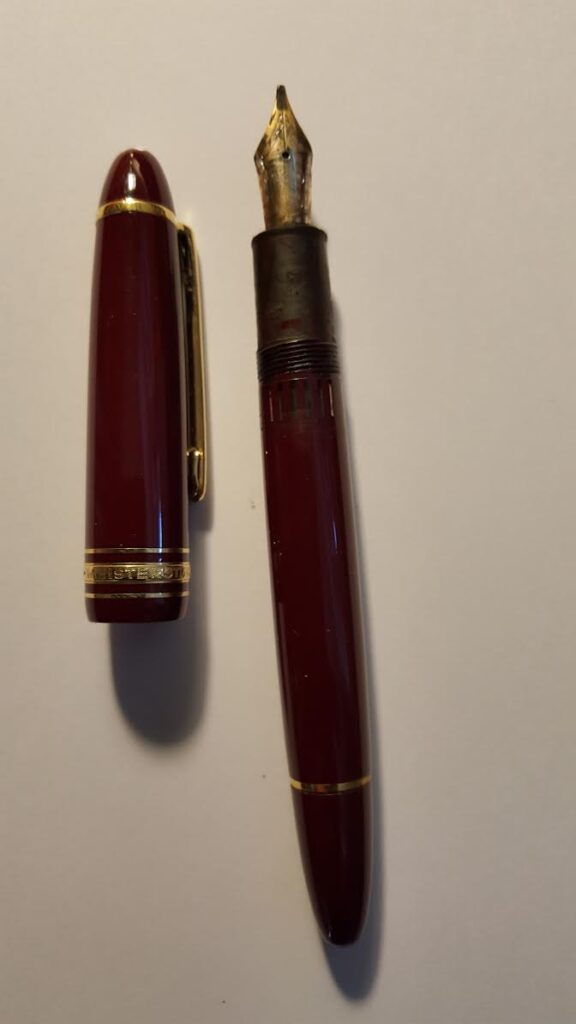 Abraham Lincoln
If given the truth, the people can be depended upon to meet any national crisis...
Abraham Lincoln
If given the truth, the people can be depended upon to meet any national crisis...
 Guildford news...
for Guildford people, brought to you by Guildford reporters - Guildford's own news service
Guildford news...
for Guildford people, brought to you by Guildford reporters - Guildford's own news service
Ockhamite Diary: Growing Gardeners and Naughty Names
Published on: 23 Sep, 2022
Updated on: 3 Nov, 2022
 A sidelong glance at the world from Tony Edwards…
A sidelong glance at the world from Tony Edwards…
How do your gardeners grow?
I‘ve found a new gardener who not only seems to know what he’s doing but also gets on and does it speedily, efficiently, and without the usual ten-minute breaks to contemplate the cala lilies. He charges £20 an hour – so it’s £40 for a two hours visit.
But he turned up recently with an assistant and the two of them worked for just one hour for the same forty quid. Then, this week, three of them dropped in for just forty minutes which, of course, makes perfect mathematical sense. Clearly, if one man works for two hours for forty quid, then three men need only work for forty minutes for the same fee.
And I have to say that all three work with the same speed and efficiency as the original gardener – so no complaints there. While one mows the lawn, another tends the flower beds and the third gets busy with a rake and a blower. And they devour weeds like a plague of locusts, so why am I ever-so-slightly concerned about my growing band of gardeners?
Well, I’ve done some sums which indicate that if my new gardener turned up with a team of twenty men next week, they’d just about have time to get out of the van before their six minutes were up – and they’d still be entitled to a forty quid payment.
As my accountant warned me many years ago, when I started to expand my then-emerging PR company: “The excellence of any service company depletes in exact proportion to its expansion.”
The game of the name
If you’re watching the new (and final) series of Doc Martin on ITV, you may have noticed that some of the doc’s patients have slightly comical names. Apparently, daft names were introduced as a running joke when the series began filming in Cornwall in 2004.
Over the years the doc has asked Onnah Todd, Germain Mann, Iona Castle, and Kay Cole (to name but a few) to, “Come through,” to his consulting room. Actor Martin Clunes, who plays Dr Ellingham, says they were all recorded in the receptionist’s book but, unfortunately, the book’s gone missing. Some of the ruder names have included Anita Bush, Drew Peacock, Ben Twilley, and Dan Gleballs.
You may also be interested to know that Doc Martin’s surname – Ellingham – is an anagram of the programme’s creator Dominic Minghella.
But the game of names is not confined to TV and has been played on the big screen too. Actor David Niven, who had a close actor friend called Michael Trubshaw, managed to weave Trubshaw’s name into the on-screen dialogue in nearly all his films. He’d just throw it in somewhere, willy-nilly, apropos of nothing.
And he usually got away with it. But when he made Wuthering Heights in 1939, director William Wyler insisted on a clause in Niven’s contract, forbidding any mention of his friend.
And all went well until a big scene on some magnificent stone steps when, as two dogs bounded up to him, Niven brushed one aside shouting “Down Trubshaw”. Wyler spotted it and cut it from the final edit, but he completely missed it in another scene – where Niven had persuaded a props man to engrave Trubshaw’s name on a tombstone. Keep an eye out for Trubshaw if you find yourself watching a David Niven movie.
Getting to the nib of the matter
My bank sent me a new debit card this week along with a long list of instructions under the heading “The Important Stuff” last of which was a directive to “Dust off a pen and sign the back.”
NatWest was, of course, implying that pens no longer get much use in this technological age where computers are king. In fact, it’s a wonder the bank didn’t send me a complimentary ballpoint to ensure I was able to comply with this bit of the “Important Stuff”.
But the fact is NatWest got it wrong. The traditional fountain pen is making a big comeback, according to new research which spotlights the eco qualities of a pen that will last you a lifetime.
Someone came up with the idea of a fountain pen back in the 1880s. They were all the rage from the 1920s through to the 1950s when the ballpoint pen took over as the writing implement of choice. But ballpoints are throw-away items while the fountain pen is for keeps.
And fountain pens have an important, quality image too. Ian Fleming gave 007 James Bond a Mont Blanc fountain pen and you’ll have noticed that world leaders always produce them rather than ballpoint pens to sign all those important international documents.
You might remember Boris tended to fiddle with his fountain pen at PMQs – taking it from his inside pocket to poke it at the opposition and returning it when he’d made his point. Your average ballpoint simply doesn’t have that kind of authority.
Novelist Graham Greene summed up the dignity of the fountain pen when he commented that his two fingers on a typewriter had never connected with his brain the way his hand and a fountain pen did. And he dismissed ballpoint pens as only good for filling-in forms on an airplane.
Others, like author Fennel Hudson, have even been inspired by the ink which flows through our fountain pens. “Proper writing ink,” he once said, “comes in a bottle which can be swirled like brandy in a glass, and smells like apple blossom after rain.” Poetic or what?
Travelling hopefully
Yet more rail strikes kick off next week and there’ll be the usual problems at Heathrow as post-epidemic staff shortages continue to cause chaos. There’s talk of more disruption for tube travellers and the outlook for travel, in general, is not looking too bright – apart from Channel crossings, that is.
The Ministry of Defence reckons well over 600 people had a hassle-free trip from Calais to Dover in 14 boats on just one day last week, bringing the total cross-Channel trips for the year, so far, to nearly 30,000.
Good to know that at least unscheduled transport services are still running to schedule, don’t you think?
Winter draws on
If you’re feeling a bit tired and listless right now, join the club. And don’t worry, it’s perfectly normal, according to the experts, who blame that flagging feeling on today’s Autumn Equinox (September 23).
Apparently, it’s because the sun is directly over the equator so the hours of daylight and night are, as near as damn it, pretty much the same today. And that’s nature’s signal to nip out, gather some nuts and berries, build a comfy nest and settle down for a bit of a winter snooze.
The experts also reckon you should combat “equinox exhaustion” by steering clear of wine for a few days so, all things being equal, you might just as well have a doze until it’s wine o’clock again. Roll on spring.
Who art in Devon
I have it on good authority that God lives in Devon and that all of us will live with him there one day. This reassuring news comes from ten-year-old Nell from South London who was one of nearly 100 children asked what they knew about God, for inclusion in a forthcoming book.
 And I’ve had a quick pre-publication peek so you might like to know that…
And I’ve had a quick pre-publication peek so you might like to know that…
- God gives us daily bread but he doesn’t do cakes;
- God never has Sundays off… ever;
- God can grow you but he doesn’t use a computer;
- The devil is scared of God;
- God visits churches all over the country for weddings and funerals;
- God sits on a cloud which is higher up than the sun;
- God sometimes gives you a baby sister when you asked for a puppy;
- God invented Christmas presents and Easter eggs;
- God gave Moses tablets for ten commandos;
- God taught Noah to make an ark for animals who can’t swim;
- God is friends with all the people who’ve died, like Henry VIII.
But probably the most relevant comment during this cost of living crisis came from nine-year-old Dan in Surrey who said…
“My mum talks to God when we need money.”
Amen to that…
I say Jeeves…
I’d no idea the writer P G Wodehouse was born in Guildford. In fact, I only discovered this week that Sir Pelham (Plum) Grenville Wodehouse KBE, to give him his full title, drew his first breath at 59 Epsom Road on October 15, 1881.
He went on, of course, to pen all those comical tales of the feather-brained Bertie Wooster and his valet Jeeves, plus a string of other literary successes including 90 books, 40 plays, and 200 short stories.
[You should read the Guildford Dragon more 😆 : Parke’s People No.2: P. G. Wodehouse. Ed.]
Join the queue?
Someone once suggested that, even when totally alone, an Englishman will form an orderly queue of one. We’re good at queueing – it’s in the blood – and if it ever became an Olympic sport, we’d grab the gold.
Yet none of us has ever before seen the marathon queues of 250,000 which accompanied Queen Elizabeth’s lying in state last week: An unprecedented demonstration of love, fortitude, commitment, dedication and resolve, braving cold nights in an endless, wearying shuffle towards Westminster Hall and a fleeting goodbye to a much-loved monarch.
But the truth is we Brits didn’t invent queuing. It was first identified and acknowledged in France in 1837 with the publication of a book called The French Revolution: A History, by the Scottish writer, historian and philosopher Thomas Carlyle of, the wonderfully named, Ecclefechan, who wrote: “A strange sight – people standing in an orderly queue to buy bread from the bakers near Paris.”
Even the word queue isn’t strictly English, coming from the Latin, cauda, meaning tail. And most Brits hate queues and queueing anyway for three fairly obvious reasons. 1) It’s a waste of time. 2) It’s boring. 3) Someone might “push-in” or jump the queue.
Nevertheless, during World War 2, people joined a queue – any queue – even if they didn’t know what they were queueing for because there was an expectation of something worthwhile or valuable at the end of the queue. For most of us, the simple equation is Queues = Rewards.
But some queues can’t be avoided. Motoring statistics confirm that the average person will spend six months of their life waiting for red traffic lights to turn green – or get six points on their licence for jumping them.
Counting the column inches
It might surprise you to know that there were more newspaper column inches devoted to the death and funeral of Princess Diana than to the whole of World War 2.

Front page of the News Chronicle, May 8th 1945, the day after the surrender of Nazi Germany. But there was very little war news on the inside pages.
I unearthed this little gem of media history a few years ago in the archives of what was then known as Durrants Press Cuttings Bureau in London. They’d been keeping track of newspaper coverage since the 1880s and had a detailed account of the column inches published throughout the last war to 1945 which they subsequently compared with the coverage of Princess Diana’s tragic death in 1997. Diana won, hands down.
I mention this only because it looks as if newspaper column inches devoted to the passing of Queen Elizabeth II will almost certainly exceed that of both Princess Diana and World War 2 at the final count.
To make sense of this you should know that newsprint paper was extremely scarce during the war years and reporting on the conflict was largely limited to front pages, with newspaper hacks being told to “get it in the first word” – keeping news reports brief and to the point.
In marked contrast, newspapers have devoted almost entire issues of 80 to 100 pages and more a day to Her Majesty’s passing during the past two weeks, and look set to follow-up with further coverage and special commemorative editions, bulging with magnificent pictures.
But, as with everything else she did in her amazing life, our late queen will no doubt prove to be a worthy winner in the column inches count.
Popular PR?
Following Taylor Wimpey’s planning application to Guildford Borough Council for a “new town” of 2,000 houses on the former Wisley airfield, local residents have noticed that both organisations are clients of PR company Cratus Communications – who also act for Surrey County Council and Wisley Property Investments.
Thought for the day
It’s not money that’s the root of all evil – it’s the lack of it.
Responses to Ockhamite Diary: Growing Gardeners and Naughty Names
Leave a Comment Cancel replyPlease see our comments policy. All comments are moderated and may take time to appear.
Recent Articles
- Guildford Institute’s Crowdfunding Project for Accessible Toilet in its New Community and Wellbeing Centre
- Letter: Guildford – Another Opportunity Missed?
- Letter: GBC’s Corporate Strategy – Where Is the Ambition?
- My Memories of John Mayall at a Ground-breaking Gig in Guildford Nearly Six Decades Ago
- Westborough HMO Plans ‘Losing the Heart of the Street’ Says Resident
- College Invests to Boost Surrey’s Economy and Close Digital Skills Gap
- Community Lottery Brings Big Wins for Local Charities
- GBC Housing Plan Promises ‘A Vibrant Urban Neighbourhood’ Near Town Centre
- Hospital Pillows ‘Shortage’ at the Royal Surrey
- Updated: Caravans Set Up Camp at Ash Manor School


Recent Comments
- Ian Macpherson on Updated: Main Guildford to Godalming Road Closed Until August 1
- Sara Tokunaga on GBC Housing Plan Promises ‘A Vibrant Urban Neighbourhood’ Near Town Centre
- Michael Courtnage on Daily Mail Online Reports Guildford Has Highest-paid Council Officer
- Alan Judge on GBC Housing Plan Promises ‘A Vibrant Urban Neighbourhood’ Near Town Centre
- John Perkins on GBC Housing Plan Promises ‘A Vibrant Urban Neighbourhood’ Near Town Centre
- S Collins on GBC Housing Plan Promises ‘A Vibrant Urban Neighbourhood’ Near Town Centre
Search in Site
Media Gallery
Dragon Interview: Local Artist Leaves Her Mark At One of England’s Most Historic Buildings
January 21, 2023 / No Comment / Read MoreDragon Interview: Lib Dem Planning Chair: ‘Current Policy Doesn’t Work for Local People’
January 19, 2023 / No Comment / Read MoreA3 Tunnel in Guildford ‘Necessary’ for New Homes, Says Guildford’s MP
January 10, 2023 / No Comment / Read More‘Madness’ for London Road Scheme to Go Ahead Against ‘Huge Opposition’, Says SCC Leader
January 6, 2023 / No Comment / Read MoreCouncillor’s Son Starts Campaign for More Consultation on North Street Plan
December 30, 2022 / No Comment / Read MoreCounty Council Climbs Down Over London Road Works – Further ‘Engagement’ Period Announced
December 14, 2022 / No Comment / Read MoreDragon Interview: GBC Reaction to the Government’s Expected Decision to Relax Housing Targets
December 7, 2022 / No Comment / Read MoreHow Can Our Town Centre Businesses Recover? Watch the Shop Front Debate
May 18, 2020 / No Comment / Read More















Carol Maidlow
September 24, 2022 at 12:57 am
Regarding the newspaper reports, I saved and brought with me to the States, and still have, a newspaper report of the death of King George VI.
Jules Cranwell
September 24, 2022 at 6:53 am
That would be the same Cratus which says on its website: “If you are a developer and you need tailored planning communications support, then look no further, we can help” and “understanding the language and context of local government and decision-making is key to reducing commercial and political risk and creating the environment for positive planning approvals”.
According to their own GBC registers of interest, Cllrs Spooner and Furniss received hospitality from Cratus at several events as the Guildford Local Plan was being drawn up. Why?
David Roberts
September 26, 2022 at 3:34 pm
Was it a fountain pen our new King showed unregal annoyance with last week? I don’t blame him: László Bíró did humanity an immense favour.
I forget which novel has the writer hero dreaming up the perfect put-down for his rival, concluding a book review with the coolly devastating line that it “lacks the necessary brio”.
This goes badly wrong when it is misprinted as “lacks the necessary biro”. All the critics are perplexed but pretend to be impressed by the reviewer’s obscure allusion.